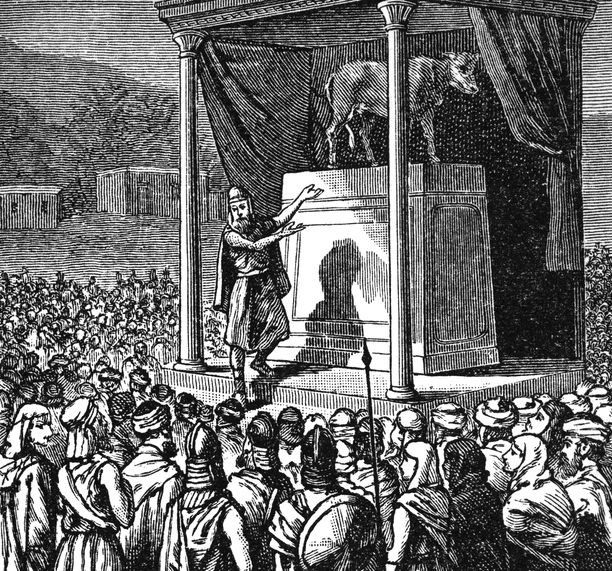Today is one of those days where we can feel chastised by the readings. We first hear of how the Lord will “allow the pride of Judah to rot, the great pride of Jerusalem” (Jeremiah 13:9). By the time we finish the Psalm, we have heard “You have forgotten God who gave you birth” four times (Deuteronomy 31:18). Not exactly the most encouraging words for a Monday morning. The passages are clearly about idolatry, but we still hear the words as meant for us.
While we might not be worshiping idols of wood and stone, we still turn to things other than God to fulfill us. For many, sweets, games, or sexual pleasures fill the void. For others, it is the good things that are loved beyond their worth: food, conversation, travel, the list goes on. In both cases, something else, whether good or evil, is put in place of God. We forget the Lord and put created things in His place.
We often forget the Lord when things are looking bleak. Faced with a tragic situation like the death of a loved one, some come close to worship of the deceased, placing them at the center of all thoughts, words, and prayers. Others become angry with God, living as if He did not exist. When in crisis, we can either turn toward God or hide from Him. This is the difference between praying for healing and failing to pray at all during a pandemic. One response acknowledges the power and goodness of God, while the other pretends that He is powerless, or at least uninterested, in time of trial.
On the other hand, we can forget the Lord when things are looking up. In times of prosperity, we can easily forget the struggle and the grace which enabled us to reach such heights. Having received glory, wealth, or power, we begin to rely on it and it alone to remain secure. We forget that without the Lord’s constant care, holding all things in existence, our good fortune would pass away. When we do not think we need help, it is easy to forget that God continues to act.
Though we can feel chastised, today is also one of those days when we feel confident that we are on the right track. After all, we follow the Lord’s commands when we hear them. We are more like the mustard seed or the yeast, humbly yielding to the growth which the Lord intends for us. We remember to rely on the Lord both in time of trial and time of peace. We can lean on God in distress and thank Him in prosperity. Even so, when we hear readings such as these we must be careful not to become too complacent. We must look for the truth in both feelings – shame and confidence –arriving at a view of reality that is balanced and accurate.
Our Gospel can help us to synthesize these reactions. Both the mustard plant and the leaven begin small. If neglected at this stage, they will remain minuscule, shriveling up and rotting like Jeremiah’s loincloth. If we forget God when we feel insignificant and downtrodden, we will only sink to lower depths. With the grace of God, we can move out of this state, just as the seed and yeast begin to grow with a little care. Though we cannot always see the growth happening, the end result is magnificent. The plant becomes a home to the birds of the sky, and the yeast becomes a large batch of dough. On the other side of the struggle, we see the constant providence of God and can rest in His peace.
Still, this time of prosperity is not the end. We can still forget the Lord, bringing us to a worse state than the first. A dead plant is worse than a live seed, and stale bread is worse than active yeast culture. It is not as if the mustard plant can become a seed again, or the loaf of bread can become yeast again. If we do not continue to cultivate our relationship with God in times of prosperity, we can stagnate and grow cold.
The first reading and Gospel remind us of the power and presence of the Lord. He is always there, watching us and providing the growth until the end of the age. Even when we turn away from Him, He cares enough to call us back. Though we can forget these things, we know that God never forgets us.

David is the Associate Director of Liturgy for a group of parishes in Pittsburgh, Pennsylvania. When he is not spending time with his wife and infant daughter, he is writing on philosophy and theology for various online publications. You can find some of these in Crisis Magazine and the Imaginative Conservative, and you can contact him at ddashiellwork@gmail.com.

